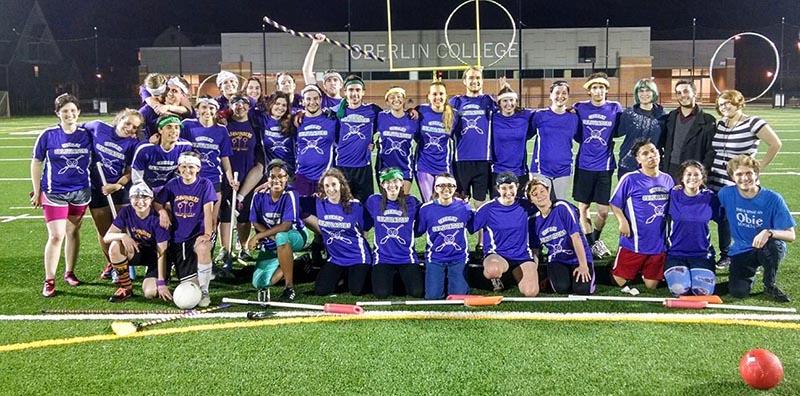Rising Popularity of Quidditch Hits Oberlin
The quidditch team poses for a celebratory photo after defeating Ashland University in its first-ever home game at the Austin E. Knowlton Athletic Complex last Friday. Quidditch officially became a club sport earlier this semester.
April 27, 2015
The quidditch team was officially named a club sport at Oberlin this semester in a move reflecting the growing number of participants on campus. The roster now has upwards of 20 people, practices up to four times a week and participates in regional competitions. As a member of the national organization U.S. Quidditch, Oberlin’s chapter functions as an all-gender-inclusive team.
The program’s initiation started off rocky. Sometimes there were not enough players to field a full team of seven, there was limited funding to attend events and Oberlin’s team only held intra-team scrimmages at first because it was not ready to play other schools. Fast-forward a few years, and the quidditch team now has a full-fledged budget and travels to events as far away as West Virginia. College senior Ethan Schmitt has seen the team through this evolution, including when the club completely ceased to exist for two years.
“Quidditch at Oberlin was started by a group of upperclassmen when I was a freshman three years ago,” said Schmitt, who has been with the team since its inception in 2011. “They decided it would be really fun, and they thought, ‘Well, we’re nerds, so why don’t we have a quidditch team?’ It was really popular right off the bat. There was a bit of a bumpy road for about two years, but this year it has really come in force.”
For those who have ever read the Harry Potter series or seen the movies, imagining a real-life reenactment of the magical sport can be difficult, if not altogether impossible. But in reality, the game is fairly straightforward and involves all the same positions as it does at Hogwarts — including the golden snitch, played by a neutral person who tries to avoid both team’s seekers. College first-year Rachel Dan said that quidditch can be strenuous and that all positions require a high level of fitness.
“People outside of quidditch see it as that silly nerd sport that people who can’t play sports do because they don’t know how to be athletic,” said Dan, who joined the quidditch team last semester after her friend suggested she attend practice. “But really, they’d be extremely surprised how physically demanding it can be and how much strategy is involved. It’s like basketball and rugby had a baby, made it ten times harder and added dodgeball.”
Despite the “nerd” reputation that quidditch has, many members of the team insisted on the aggressive nature of the contact sport. Although no one will be plummeting hundreds of feet toward the ground off their broomstick necessitating a Hermione Granger-style rescue, there is still plenty of room for injury — especially as athletes try to run with a broomstick between their legs. College sophomore Maya Martin dismissed the idea of quidditch being less demanding than other sports.
“It’s a full-contact sport,” Martin said. “People think we’re a bunch of nerds trying to play sports, but really, we practice at least three times a week for an hour and a half, and there’s lots of tackling.”
Overall, many members of the team expressed that playing quidditch has provided a sense of belonging and family. Martin explained that many people on the team often felt uncomfortable when participating in sports, but quidditch has provided a productive and safe outlet.
“There’s this feeling that everyone takes you seriously as an athlete and as a player,” Martin said. “As someone who hasn’t done a lot sports previously, that’s been something that has been hard for me in the past. Whenever I do want to play sports, people are like, ‘You’re female presenting, or you’re not very athletic, so we’re not going to take you seriously, which isn’t true when you play quidditch.”


























